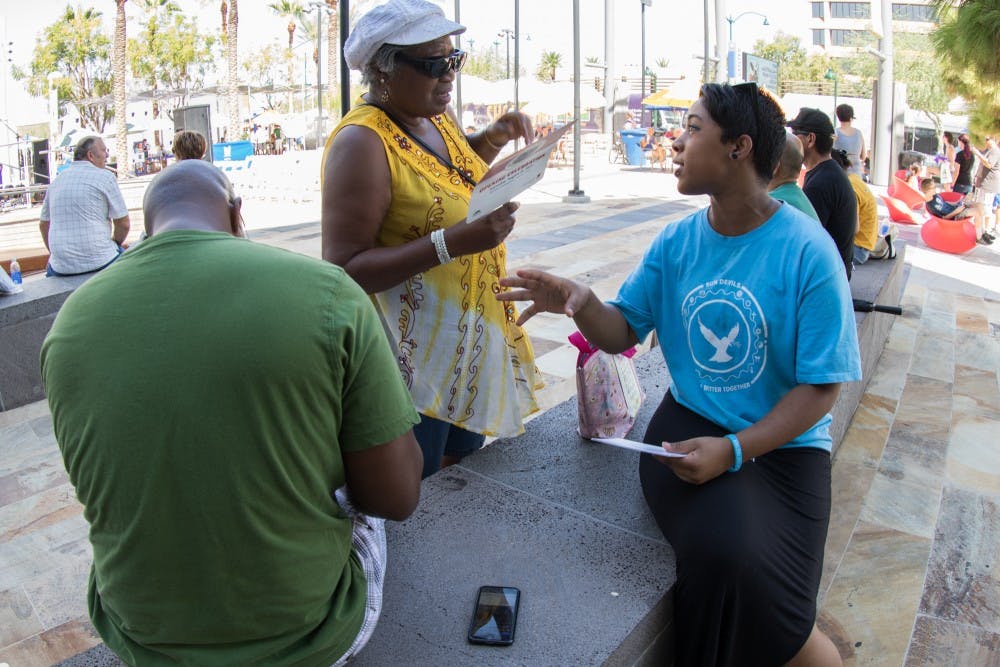Members of Sun Devils Are Better Together, an interfaith student organization on campus, gathered Saturday morning to speak on behalf of and canvas for a non-discrimination ordinance in the city of Mesa.
Founder and president of SunDABT Johnny Martin said at a board meeting that quite a few SunDABT members lived in Mesa.
“The idea that there are places in our community where there are absolutely no provisions for non-discrimination at an official level is very scary for a lot of people," he said.
Martin said that the four present members of SunDABT come from minority religious backgrounds.
“Any one of the four of us could be denied service or public accommodations because somebody disagrees with our faith or our religious beliefs,” he said.
Of those four members, three are part of the LGBT community, he said.
“Anybody could deny us any type of service because they disagree with our orientation or our gender identity,” Martin said. “I’m the only one of the four of us who is a white person. The other three of my colleagues here could be denied service or public accommodations because someone doesn't like their race or the color of their skin. That’s a really, really scary thing.”
The One Mesa Pledge was developed by Mesa Mayor John Giles as a “compromise.” Instead of a fully inclusive non-discrimination ordinance, this pledge does not satisfy the needs of local community advocacy groups, Martin said.
“There’s no substance behind it; it’s just nice words, but someone could easily sign it and still discriminate against someone at any time for any reason and there would be no repercussions,” he said.
Rather, the members of SunDABT support the passage of a fully inclusive non-discrimination ordinance in Mesa, which will legally bind businesses denying service based on discrimination.
The four members canvassed after the meeting, handing out Unity Pledges, urging residents at the Mesa light rail grand opening to sign the pledge. These Unity Pledges, which focus on LGBT residents, will be sent to city of Mesa councilmembers. In half an hour, the members encouraged more than twenty people to sign onto the pledge.
Anthropology sophomore and SunDABT member Aspyn Adams hoped that the outcome of the non-discrimination ordinance will include change for the younger generation.
“The non-discrimination ordinance is necessary for Arizona if we want to get a different reputation,” she noted.
Before Aspyn came to Arizona from California, her mother warned her to be wary of the “grumpy, old white people."
Marissa Krings and Aspyn Adams sign cards for the non-discrimination act, which will be sent to Mesa City Council. pic.twitter.com/l4FuBXJneI
— Jenny (@jenny__ung) August 22, 2015
Alumnus Permpreet Gill previously lived in Mesa before moving to Phoenix.
“I lived in Phoenix for years, but 10 years earlier I’d lived in Mesa,” he said. “I didn’t know that some cities in Arizona had this discrimination (problem), where people could discriminate against you because of your race, faith, gender or sexuality.”
Gill says that he often does not feel welcome in Mesa. Residents of Mesa have also assumed him to be Muslim, rather than Sikh.
“I don’t want to say I’m ashamed of being from Arizona, but as someone who’s been discriminated against, I’m happy to see steps happening for the next generation so that we can move forward and make Mesa more open,” he said.
Related Links:
The distorted meaning of discrimination
Legalized discrimination will affect more than LGBTQ community
Reach the reporter at jenny.ung@asu.edu or follow @jenny__ung on twitter
Like The State Press on Facebook and follow @statepress on Twitter




